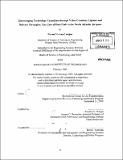Encouraging technology transition through value creation, capture and delivery strategies : the case of data link in the North Atlantic airspace
Author(s)
Campos, Norma Viviana
DownloadFull printable version (17.44Mb)
Other Contributors
Massachusetts Institute of Technology. Technology and Policy Program.
Advisor
Annalisa L. Weigel.
Terms of use
Metadata
Show full item recordAbstract
This thesis studies the problem of data link in the NAT under a technology transition framework of value creation, capture, and delivery. Creating value through a new technology, such as data link, refers to designing competitive value propositions for stakeholders. Capturing value means recovering an investment in a technology through the value it creates. Delivering value refers to developing policies and business strategies to enable value capture. Realization of these concepts is necessary to guarantee technology transition. Data was gathered from a survey of the two major stakeholder groups in the NAT, commercial operators and ANSPs. The survey covered five major research areas: 1) Perceived operational and coordination inefficiencies; 2) Opportunities to improve service; 3) Current and projected data link equipage and infrastructure in the NAT; 4) Value distribution of data link costs and benefits; and 5) Potential policy strategies to encourage data link adoption. The study found that data link creates value for stakeholders through an understanding of the evolution of technology and stakeholder needs. Fuel penalties associated with flying suboptimal flight levels and routes is the largest inefficiency in the NAT. Data link, particularly through the FANS system, is seen as the enabling technology to improve efficiency of operations. Reducing separation is the data link application most valued by stakeholders. (cont.) Coordination and harmonization issues threaten to limit the value created. Data link diffusion (airborne equipage and ground infrastructure) is not always guaranteed as a result of value created due to improvements in technical performance. Value capture is limited due to unbalances in the distribution of data link costs and benefits. So far, data link operational benefits have been significant but have not yet translated into economic benefits given that such applications have not been implemented in the NAT. Delivering value from data link is more than balancing costs and benefits. Uncertainty in a number of issues needs resolution before the value created through data link could be fully captured and delivered. A combination of operational, financial and regulatory schemes may be necessary to leverage costs and benefits and ensure successful data link value delivery to all stakeholders.
Description
Thesis (S.M. in Technology and Policy)--Massachusetts Institute of Technology, Engineering Systems Division, Technology and Policy Program, 2009. Cataloged from PDF version of thesis. Includes bibliographical references (p. 146-151).
Date issued
2009Department
Massachusetts Institute of Technology. Engineering Systems Division; Technology and Policy ProgramPublisher
Massachusetts Institute of Technology
Keywords
Engineering Systems Division., Technology and Policy Program.